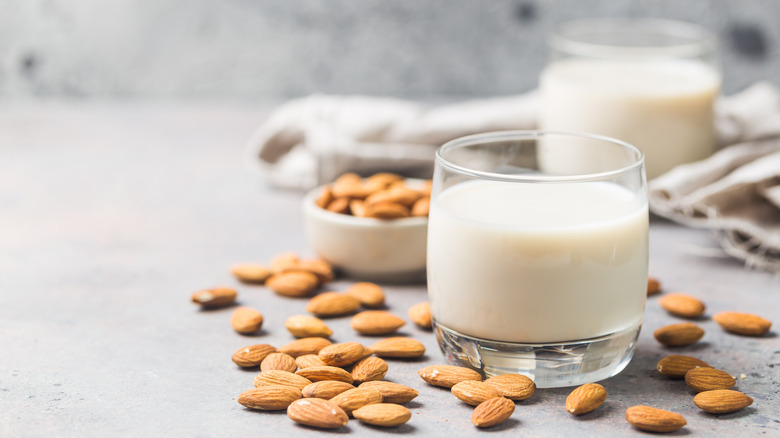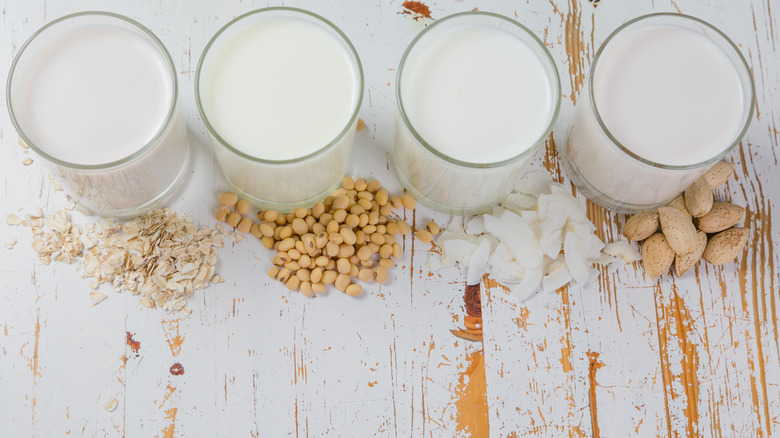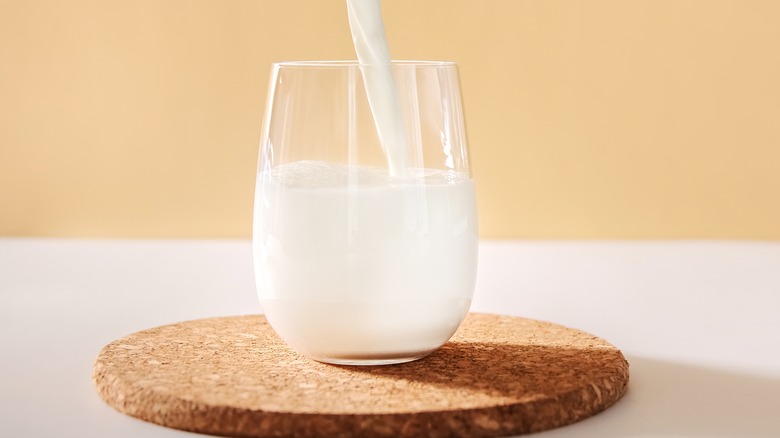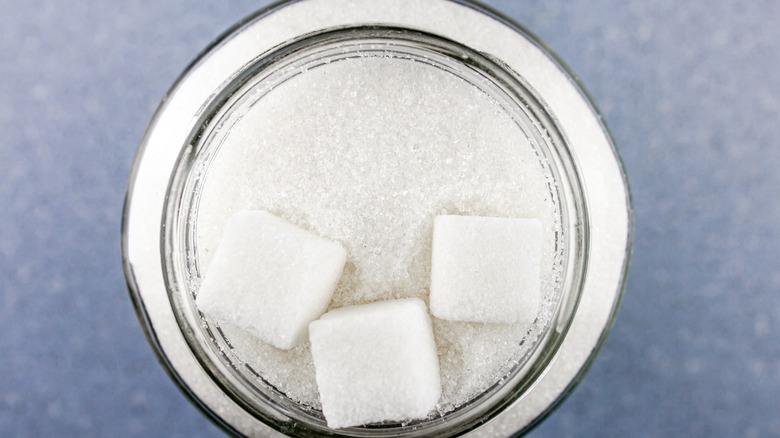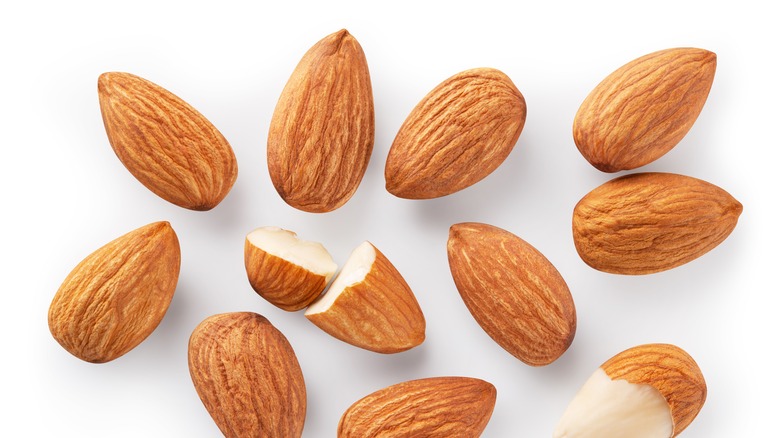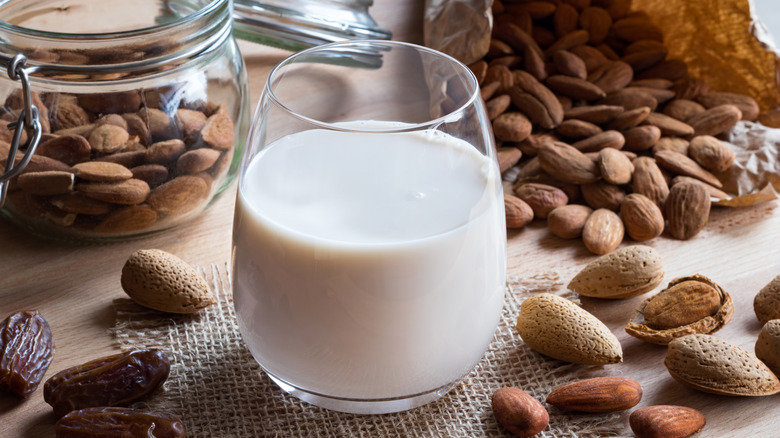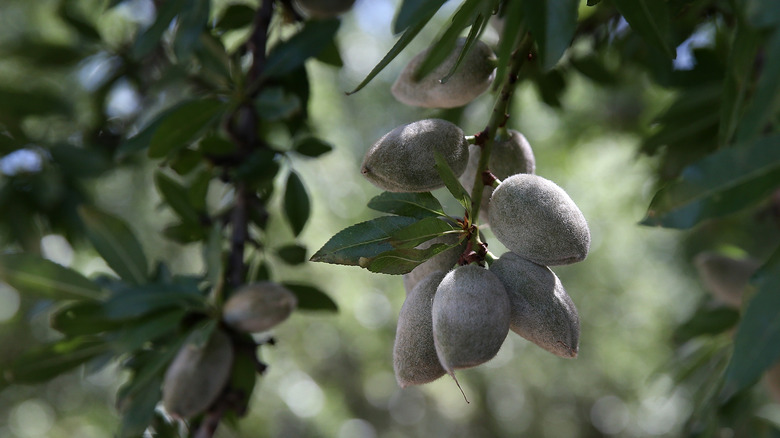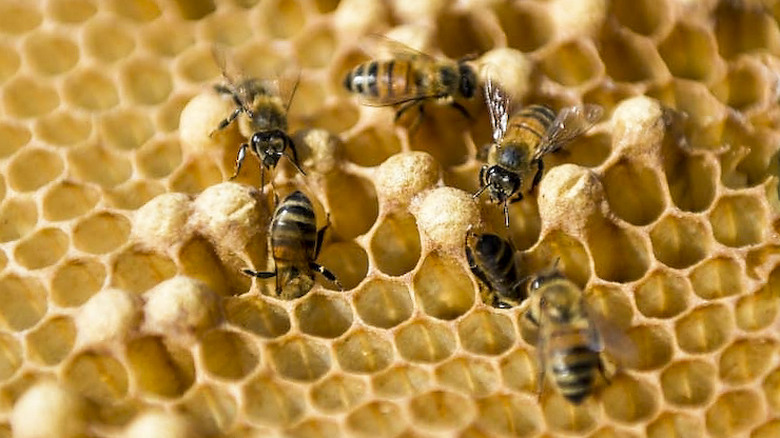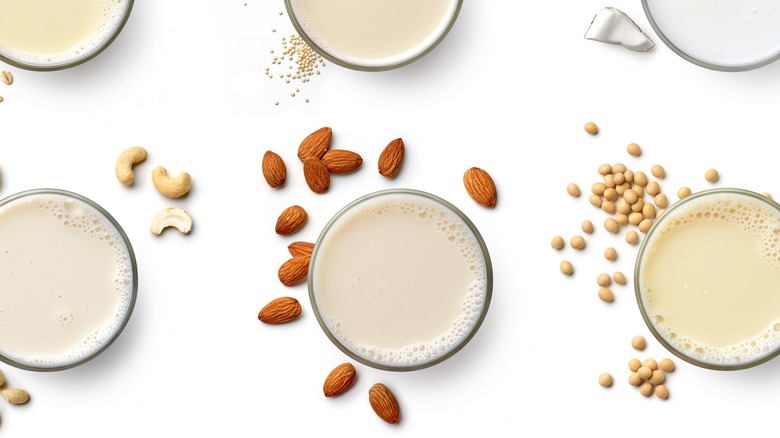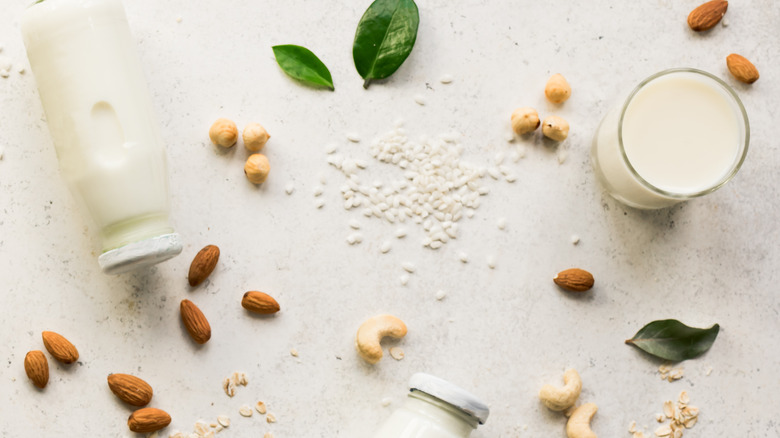Everything You Need To Know About Almond Milk
In the world of alternative milks, almond milk is a pretty popular one. Between 2010 and 2015, the consumption and production of almond milk surged by 250 percent.
Almond milk first arrived in Starbucks in 2016, and chances are good that these days you'll be able to find it at your local coffee spot or even smoothie shop. It's popping up everywhere, and even regular grocery stores have multiple varieties and brands of almond milk and other plant-based milks available. No longer is it niche or delegated to health food or vegan grocery stores.
Today, you can find yogurt and ice cream and whipped cream in a can made with almond milk — it's more or less as normal as the dairy originals. The growth of the alternative milk can't seem to be stopped, but as it becomes more and more mainstream, it's important to understand as much about the drink as possible, especially when it comes to your health and the environment.
This is the untold truth of almond milk.
Sales of non-dairy milks rose over 60 percent from 2013 to 2018
It's not just almond milk that's doing well these days, it's most non-dairy milks.
Dean Foods declared bankruptcy in 2019 and is just one of many dairy brands feeling downtrodden at the dip in dairy sales over the past few years. Sales of non-dairy milks have increased over 60 percent between 2013 and 2018, reaching over $2 billion in 2017, and only have grown higher in subsequent years.
Part of the rise in sales is because dairy alternative milks cost more, but they're also just being bought more often than they ever have before. Intolerance to dairy is the leading reason for this choice among consumers, as many people tend to be lactose intolerant. Blanketed health reasons are another factor for reducing dairy, but it's concerns about some instances of animal abuse in the dairy industry that seem to be rising the most. Protests against the diary industry have been appearing more and more often over the past year, including Joaquin Phoenix's Oscar speech for Best Actor and protesters rushing Joe Biden during Super Tuesday. It's something that is in the public eye more than ever, and it's becoming something many consumers are asking themselves; should they be consuming dairy when there are plenty of alternatives?
Almond milk is the most popular alternative milk
While soy milk used to rule the alternative milk sales, almonds are now king. "Nuts are trendy now," Larry Finkel, director of food and beverage research at Marketresearch.com told Bloomberg. "Soy sounds more like old-fashioned health food, like tofu, and could probably benefit by a re-invigoration of their brand."
As of 2019, sales of almond milk reached $1.3 billion, according to data compiled by CNBC. Soy milk, which came in at the number two most popular non-dairy milk option, was way behind, only reaching $194 million during that same time period.
Almond milk has also become a favorite among nutritionists and healthy eating enthusiasts. "I recommend it often, especially with patients who have diabetes or kidney disease. High quality almond milk provides a calcium boost, healthy fats but less carbs than it's cow's milk alternative," Jennifer Bowers, PhD, RD, told Mashed. "And, I think it tastes great!"
Some almond milk is lacking in the nutrient department
While almond milk gives the lactose intolerant crowd a chance to have milk again, it's not a true substitute for cow's milk. Almond milk can be lacking in the protein and calcium departments. "Some people substitute cow's milk for almond milk entirely and are not aware of the nutritional differences, which can be especially problematic for women and breastfeeding women with calcium, vitamin D, B vitamin and protein needs," says Lisa Cohn, registered dietitian for miVIP Surgery Centers. "The calories from almond milk can also create weight gain." Watch your labels and make sure you're still giving your body other sources of protein and calcium.
If you really want to stick to almond milk, there is a variety you should be looking for.
"Almond milk isn't as bad as people make it seem, it is actually very nutritious," Valerie Agyeman, DC-based registered dietitian nutritionist, told Mashed. "Don't get me wrong, it isn't as nutritious as cow's milk, but enriched almond milk comes pretty close to hitting the nutritional content of cow milk." Check your labels and look for almond milk that has been enriched with extra nutrients.
Almond milk could be linked to inflammation
Next time you're loading up on almond milk at the grocery store, read the label carefully. Some brands contain carrageenan, a common thickening agent made from seaweed. It gives almond milk and other processed foods that creamy texture.
According to a review in Environmental Health Perspectives, studies have linked consuming carrageenan with increased inflammation in the body.
"Although it is derived from seaweed, which sounds pretty healthy, studies have shown that carrageenan causes inflammation in the body," says nutritionist and healthy living expert Valérie Orsoni. "Research on the effects of this additive is not at all conclusive, but based on studies thus far, I highly recommend avoiding almond milk that contains carrageenan."
Almond milk helps control blood glucose levels in people with diabetes
Cases for type 2 diabetes are finally on the decline after a 20-year increase, according to the CDC. This can be attributed to many things, but one of those undoubtedly is people being more mindful of what they are putting in their bodies. This extends to milk, of course. Regular cow's milk is naturally higher in sugar that non-dairy alternatives that haven't been artificially sweetened. Because of this, many people who have diabetes or are hypoglycemic have turned to plant-based dairy to help control their blood glucose levels.
Almond milk has one of the lowest natural sugar counts, with on average 2.12 grams of sugar per cup, compared to the 12.69 grams of sugar in the same amount of low-fat cow's milk. It's also much lower in carbohydrates, at 3.43 grams per cup in comparison to 12.18 grams of low-fat cow's milk. Tree nuts have been studied to help control blood sugar levels, and so it comes as no surprise that almond milk is able to do this as well.
Maintaining a healthy weight is also key for those with diabetes or those approaching a diagnosis. Almonds and almond milk are high in healthy fats, and offer many nutrients that can assist in weight loss. Almond milk isn't going to prevent diabetes or cure anyone, but it is a much smarter alternative to cow's milk when it comes to sugar, carbohydrates, and maintaining a stable blood glucose level.
Watch the sugar content in some almond milks
Not all almond milk, however, is low in sugar. As with any processed food, you have to check the labels. While enriched almond milk is great for the extra vitamins and nutrients, make sure you're not getting any other additives you don't want.
"Almond milk can sometimes be very high in sugar because manufacturers usually add a lot of sugar to make it taste sweet," says Valerie Agyeman. "Make sure to look at the nutrition facts label for the sugar content or you can purchase sugar-free almond milk."
Those added sugars definitely make almond milk tastier, but if you're choosing almond milk for health reasons, added sugars aren't doing you any favors.
Almond milk can be keto friendly
The ketogenic diet is one that has seen a consistent popularity in the past few years. Based on a low-carb lifestyle, the purpose of keto is to get your body to burn fat by sending itself into ketosis. This diet doesn't allow for high amounts of sugar and carbohydrates, and typically relies on full-fat foods instead. When it comes to milk, this poses a bit of a quandary. However, those who do keto are in luck. Almond milk is perfectly keto friendly — as long as you're avoiding the added sugar varieties.
There are plenty of unsweetened versions that are not only healthier, but are also allowed by keto diets. The main issue with milks in general for people practicing keto are the macro nutrients, specifically the carbohydrates. Unsweetened almond milk is relatively low in carbs, at least in comparison to whole milk and other non-dairy alternatives. In fact, it has only 2-3 net carbs in a serving, making it entirely appropriate to consume while on the strict diet. Having one or two servings of almond milk a day isn't going to break the carb bank, and if you're an active person or someone practicing the Targeted Keto Diet, you can consume even more if you like.
Almond milk is not as healthy as plain almonds
If you've been drinking almond milk for the nutritional benefits, you're definitely better off eating just a handful of actual almonds. In a one-ounce serving of almonds, you'll receive six grams of protein, four grams of fiber, and plenty of vitamins including vitamin E, magnesium, riboflavin, calcium, and potassium.
The almonds in almond milk are seriously diluted, so don't expect the same benefits. A one-cup serving of almond milk has about 30 calories, 2.5 grams of fat, and just one gram of protein.
"While almonds in their whole form are packed with protein, almond milk on the other hand only has one gram per cup. This is because almond milk is strained, causing a lot of the protein to be lost," dietitian Emily Holdorf, RDN told Mashed. "If you are drinking almond milk as your main 'milk product' be sure to get enough protein from other foods in your diet."
Almond milk could prevent cancer
Not only is almond milk a delicious treat, but it has actually been linked to slowing the growth of prostate cancer. A 2011 study reported that drinking almond milk can suppress prostate cancer cells. Researchers studied cancer cells exposed to cow's milk, almond milk, and soy milk. Cow's milk stimulated the growth of these cancer cells, while almond milk actually suppressed that growth by more than 30 percent. Researchers also exposed breast cancer cells to almond milk, but there was no effect. So gentlemen, drink up.
Almond milk may cause nutritional deficiencies in infants
Almond milk has proven health benefits for many types of people, but not everyone. When it comes to the nutrition and health of infants, almond milk is one way you should never ever go. At least according to Dr. Julie Lemale, who is a researcher at Hôpital Trousseau in France. Her 2014 study came to the conclusion that infants who drank almond milk had nutritional deficiencies as well as growth problems. If your child is allergic to milk or lactose intolerant, consult with your pediatrician for helping finding an appropriate formula.
A lot of this can be trailed back to the fact that almond milk doesn't contain a high amount of protein, calcium, or other much-needed nutrients, even when fortified. There is also not as many vitamins and minerals in almond milk that infants need as they're growing. While this may not be as much of an issue for an adult, for a growing child, it's critical. Growing children need calcium to strengthen their bones during important growth periods. Denying them that can lead to serious complications and osteoporosis down the road.
This isn't to say that toddlers and children can't have almond milk. It just needs to be in addition to something else that has the nutrients they need. Think of it as an accompaniment rather than the main beverage of choice.
Dairy farmers aren't happy about almond milk
Almond milk and its alternative milk friends are gaining traction among consumers, and there's one group who is not lining up for some of that sweet nut milk — dairy farmers. Dairy farmers and some government representatives have been lobbying the Food and Drug Administration to stop allowing almond milk manufacturers to use the term "milk" to describe their product.
Representative Peter Welch and Senator Tammy Baldwin have stated that in order for a product to be called milk, it must come from a hooved mammal. "The bottom line for us is that milk is defined by the FDA, and we're saying to the FDA: Enforce your definition," Mr. Welch told The New York Times.
The consumption of almond milk goes back to the Middle Ages
You might be surprised to know that consuming almond milk is, in fact, not a new trend. Not only has it been drunk by people well before the 2000s, it spans back all the way to the Middle Ages. That's right. It wasn't just grog, beer, and wine they were drinking back in the medieval period. It was almond milk. Or more specifically, it was the upper classes that were drinking almond milk, as well as the pious. See, it's not permissible to drink milk during Lent, so the people of medieval Europe needed a substitute. Almonds were in plentiful supply, especially in the Mediterranean, and so almond milk became the drink of choice.
Almond milk wasn't only consumed during Lent, however. The use of it grew quite popular in every day life. A German cookbook which dates to approximately 1350, Das Buch von Guter Spise, asks for almond milk in almost a quarter of its recipes. One could even go so far as to say that the people of the middle ages were downright obsessed with almonds and almond milk.
Professor Melitta Weiss Adamson of the University of West Ontario studied the diet of 15th century Dorset priests in her book Food in Medieval Times. In it she explains that almonds had to have had a substantial and significant role in their diet by the sheer quantity of almonds bought.
A lot of the world's almonds come from California
Almonds are incredibly important to California. In fact, 80 percent of the earth's almonds are grown in California — including 100 percent of the commercial supply in America. And with people today eating more nuts than ever, keeping this crop viable and plentiful is the backbone of California's agriculture. Almond orchards take up over one million acres in the state, and all those acres of trees produced 2.26 billion pounds of almonds in 2018. Almond growing is a $5.6 billion industry, and one that California is on top of.
California is such a great place to grow almonds because of its hot and dry climate, as well as the ability to use snow melt from the mountains. It's the best of both worlds. The orchards are also heavily mechanized, so the cost of labor is much lower than other nuts and produce. That's more money in the pockets of the farmers of the sunshine state. Almond production is at an all-time high, and as their uses as dairy-alternatives continue to grow, so do the sales. With luck, almond milk will become more affordable every year as almond groves continue to do well in California and the demand remains high.
Almonds use a ton of water
Almonds take a lot of water to grow, and we mean a lot. A single almond takes up to 1.1 gallons of water to grow. Just a single almond. Multiply that by the millions to billions grown every season to create popular products like almond milk, and it's easy to see an issue. In order to grow almonds and meet ever-increasing demands, Californian farmers have been drilling wells at an alarming rate. California has long been at risk of becoming a desert, and the constant over-drilling (including for wells for the growing of nuts) has contributed to the decline of usable soil. Almonds take a lot of water to grow. According to Mother Jones, the almond business uses more water in California than the entire cities of Los Angeles and San Francisco combined.
If there isn't enough water, almonds simply can't survive. And if almonds aren't being harvested, there goes the almond milk sales. Almonds are a big money maker, but is the amount of water needed enough to justify it? Many people and critics have asked this, yet with almond milk consumption up every year, it's hard to blame farmers for pressing on.
That being said, measures are being taken to reduce the water impact of almonds in California. By 2025, almond farmers have pledged to reduce the amount of water needed by 20 percent.
Pesticides used on almond trees are harmful to the bee population
It's not just the issue with water that's having an effect on the environment when it comes to almonds. Pesticides are a major issue in commercial almond farming. The use of chemicals has been known to toxify California's farmer's drinking water. Additionally, testing from the Pesticide Action network found many of these pesticides are toxic to honey bees. Not only do almonds needs honey bees to survive, but bees are already at great risk nationwide and worldwide. Ways to mitigate this are to buy certified organic and pesticide-free almond milks.
This problem has gotten worse in recent years. Because of the still unexplained Colony Collapse Disorder that started in 2006, honeybees have become more expensive to bring in to help pollinate the almond trees. However, because of the high almond demand, in large part due to the rise in popularity of almond milk, there is a large incentive to truck in bees — no matter the cost. California is actually the largest user of commercial pollination because of their almond production, and as such, the state contains half the population of honeybees in the entire country. It's also created a rebound nationwide of bees, a trend we can only hope continues.
You can make almond milk at home
Making your own almond milk may seem like a daunting task. After all, how do you milk an almond? Well, the trick is that you don't at all. Almond milk is made by soaking almonds in water for an extended period of time, blitzing them in a blender, and then straining them. The trick is to soak the almonds for a very long time. We're talking 8-12 hours. Make sure you fully submerge your almonds in water and then let nature take its course.
Your almonds will be plump after soaking. Drain the almonds and then put them in a blender with a small amount of room temperature water. Blend until you have a thick paste and then pour the contents into a bowl, where you'll add boiling water and let them steep for 10-15 more minutes. After that, it's time to strain with a cheesecloth. Voila! Almond milk!
What's great about making your own almond milk at home is that you can flavor and enhance it any way that you want. Plain almond milk has a light almond flavor, but is pretty much a blank canvas. We suggest adding in some vanilla and cinnamon or nutmeg for a warm cozy taste. If you want to get fancy, add in some matcha or even lavender for an aromatic almond milk.
Almond milk is great for your skin
Almonds and almond milk aren't just for consumption, they're actually a very versatile ingredient. There are multiple health benefits to the nut, including your skin. Plenty of cosmetic brands from The Body Shop to Lush to L'Occitane use almond milk in their products to help nourish skin. Almond milk is incredibly moisturizing and can help seriously soften your skin, especially on your face. Almond milk, blended with almond oil, can reduce fine lines and help smooth skin. Almonds are rich in flavonoids, specifically catechin, kaempferol and epicatechin, which are antioxidants. They protect skin cells from oxidizing, thus preventing premature wrinkles.
Also, because of its moisturizing benefits, almond milk is used in masks, lotions, and body butters to really penetrate the skin for maximum hydration retention. Almond milk based products are always great for those with sensitive skin, given its nourishing properties. Making almond milk masks at home is easy. It can be as simple as dipping a cotton ball into some milk and spreading it on your face. If you want some exfoliation involved, mix almond milk with oatmeal and a little bit of honey and spread it all over. Not only will your face be impeccably soft, but you'll smell nice too!
Almond milk could improve your heart health
You already know almond milk can be a tasty way to mix up your latte or morning bowl of cereal, but did you know almond milk could also improve your heart health? According to WebMD, almonds contain a lot of Vitamin E, which is an antioxidant that may help lower your risk of heart disease, and even stroke or cancer. Who knew the mighty almond basically acts like a secondary health insurance policy?
And it gets even better because according to one study, almonds have been shown to reduce LDL-C, also known as the "bad" cholesterol. The lower your LDL, the lower your risk for coronary heart disease. There is also ample evidence that eating almonds can help increase your HDL-C, or "good" cholesterol. So just by swapping in a little more almond milk in your diet, you're decreasing the bad stuff and increasing the good stuff. Your heart and taste buds will thank you!
Almond milk is good for about a week
We've all experienced the rancid stench of dairy milk that's gone bad. Some of us are still trying to forget it. But one of the many perks of plant or nut based milks like almond milk is that they don't go bad. Or do they? It turns out almonds can in fact go rancid after a while, which happens when oxygen and the unsaturated fats inside the oils mix and mingle for a while (via Blue Diamond Almonds). So what does that mean about the carton of almond milk in your fridge?
According to nutritionist Brittany Modell, homemade almond milk has the shortest lifespan of about five to seven days since it lacks any preservatives. Store-bought almond milk tends to be ultra-pasteurized so it lasts longer, especially if you keep it in the back of the fridge where it's colder. But still, she recommends you try to consume it within seven days. Shelf-stable almond milk, as the name suggests, can last one to two months unopened, but should be consumed within seven to 10 days once opened and refrigerated. Look out for any clumps, stinky smells, or a bloated, gas-filled container as these are all signs your almond milk has gone bad and needs to be tossed.
Almond milk is vegan
We know that almond milk is a popular plant-based milk. But what you may not know is that just because something is plant-based does not mean it's fully vegan. To be considered truly vegan, foods cannot contain any animal products or by-products, which include mik, cheese, eggs, and even honey (via Which.) Just because a food item is labeled as plant-based doesn't guarantee it won't also contain some dairy or even honey.
But for all our vegans out there, you can rest assured that almond milk is indeed vegan (via Everything Vegan). But just in case, be sure to check labels because the only risk is the sweetener. Luckily, commercial almond milk producers don't typically use honey to sweeten their almond milk. And if you're someone who is starting to dip a toe into veganism, either for personal health reasons or because of all the environmental benefits of cutting back on meat, then starting by swapping out cow milk for almond milk could be a great place to start!
Almond milk is a lower calorie milk alternative
There are a lot of reasons to drink almond milk, but another good reason is that it's a lot lower in calories per serving than cow's milk. If you're watching your calorie intake or are trying to be more health-conscious, this is good news! A cup of almond milk usually contains between 30-45 calories and only 2 grams of fat, whereas a cup of 1% cow's milk will be around 100 calories (via Cleveland Health.) While there's much more to healthy eating than simply counting calories, it's still good to keep in mind.
The exception to this rule would be sweetened or flavored almond milks as those will pack on additional calories from sugar. For example, chocolate flavored almond milk will have around 21 grams of sugar in a cup-sized serving (via Healthline.) But you can avoid those extra sugar calories by simply buying unsweetened almond milk, which has only about 2 grams of sugar per cup.
